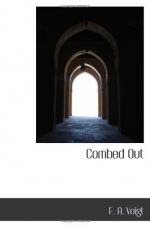“Sure—and we’ll get a day off at least.”
We continued to talk of commonplace things. It was several hours after midnight and the uproar was dying down a little. I felt sleepy and something like contentment was beginning to steal over me once again.
Reveille did not sound until nine o’clock on the Monday morning. The whistle blew for parade. There would, of course, be an official announcement that the Armistice had been signed and perhaps a letter of thanks to the “splendid troops who had won the war” (which would bore us extremely) and a holiday (which would be welcomed with loud cheers).
We paraded. The Sergeant-Major addressed us:
“I’m sorry, boys, but nothing official’s coom through. You must go to work as usual. It’s a damned shame, I know, but I can’t help it. I expect the message’ll coom during the day and you’re sure to get to-morrow off.”
There was a murmur in the ranks, but bewilderment deprived us of the power of taking concerted action. A sudden fear seized me—could last night’s celebrations have been the result of a false alarm?
We marched off. But no one did a stroke of work the whole day. All discipline had gone. The N.C.O.’s had no vestige of authority left. Men from other units whom we met knew no more than we did. They said the Armistice had been signed, but there had been no official announcement.
We got back to camp in the afternoon. No official news.
In the evening the celebrations were renewed. I was troubled by an intense anxiety which began to spread to the others. Still, there would certainly be an announcement the following morning.
We paraded on Tuesday morning. No announcement of any kind. We marched off to work as usual, but again no work was done. Suddenly I caught sight of a soldier walking along the road a long way off with a newspaper in his hand. I ran after him and caught him up.
“Any news?” I asked.
He gave me the paper. It was dated Monday, the 11th November—only a day old. The headline ran: “No Armistice yet.”
So Sunday’s demonstration had been a sham and a fraud!
I rejoined the others. They, too, had heard that no Armistice had been signed by Sunday midnight from a despatch rider who had, however, added that signature was expected every minute.
We were back in camp. Many new rumours were circulating—the Germans had rejected the terms, the Italians had renewed the offensive. In the evening some of us thought they could hear distinct gunfire. We listened carefully, but our mental tension destroyed our power of hearing very faint sounds.
Wednesday morning, and still no definite news. The suspense was becoming unbearable. No work was done. I questioned men from five other units, but none of them were any better informed than we were.
The expectation of peace had made us forget our bitterness towards the army, but it began to show itself again:




